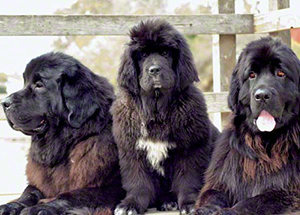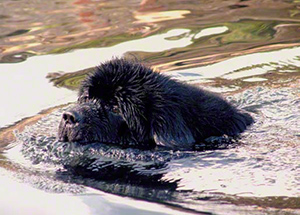Traveling with your Newfoundland can be a wonderful experience or a disaster. A little planning and foresight will help keep your trip on track and have you eagerly planning your next adventure. Whether your plans take you across the country or involve a day trip to go hiking, some of these simple reminders may be in order. In fact packing for the unexpected mishap is a good rule of thumb.
I would strongly recommend the use of a crate when traveling. This becomes a safe haven for your dog. Tie the crate down so that it is held sturdily in place. If your dog is a chewer, a crate will keep your belongings and the inside of your vehicle intact. A Newfoundland can become a large projectile in the event of a car accident. A frightened dog may wander far from the accident scene or worse, inhibit emergency personnel from helping you. Play it safe and use a crate. Water is another important item. In the event it is hot or you have car trouble, you will be able to keep your Newf sufficiently hydrated and cool. Some Newfs get diarrhea with a change of water so if you are traveling out of town you may want to purchase bottled water at a nearby store. CLEAN UP AFTER YOUR DOG! I cannot stress this particular item enough times. Be prepared. Put a large plastic bag in your pocket before exercising your Newf. Put the plastic bag over your hand like a mitt, scoop up the waste and draw the remaining part of the bag over the waste matter. Then tie the bag closed and deposit it in the nearest trash receptacle. If you are unsure how to do this, practice picking up a large dog toy with your hand enclosed in a bag. All kidding aside, it must be hard to do judging from the number of people who do NOT clean up after their dogs.
Pack dog food, treats, medications and vitamins in an insect and moisture proof container. If your Newf is a nibbler, make sure the water and food containers are packed out of his reach. Upon arrival at your destination, you may want to scan the area phone book and note where the closest veterinary clinic and emergency veterinary hospital is located.
If staying in a hotel that allows pets, a little courtesy goes a long way. Hotel staff will be thrilled that you travel with a crate. Upon check in, inspect your room for any damage to carpet or furniture and report it to the hotel manager right away lest you and your dog are blamed for the damage. Always clean up after your dog and do not allow him to bother other guests.
Once in your hotel room, remove the bedspread and place an old sheet over the covers. This will help to keep blankets free of dog hair and drool. Also an old sheet or tarp placed under the crate will catch excess hair and help to keep the carpeting clean. Feed and water your dog in the bathroom to facilitate easy clean up. Dispose of any uneaten dog food, feces, or vomit in an outdoor trash receptacle. Make sure to pay for any damages your dog may incur.
The following is a list of supplies that is by no means complete. See what items you can add to your Newfie's luggage. • Pack your NCA directory! In the event of an emergency you can contact an NCA member or you may wish to meet other members in the area. This is also a great way to get recommendations for a vet, boarding facility or dog friendly hotels and parks. • Your dog should carry identification: attach tags to his collar. And you should pack a current photo of your dog, vaccination record, rabies certificate and health certificate if needed. You should have written instructions including at least two names, addresses and phone numbers of people whom you would trust to take care of your dog in the event you are incapacitated. If there was an emergency, could someone you know take charge of your dogs for you? Make provisions ahead of time and have a plan. On your list of items to pack should be: • Small fire extinguisher • Water -Three gallons or more • Cooler-Filled with ice for you and your Newf • Food, including treats, vitamins and medications. Keep medications in the original containers. • Bowls (for both water and food) • Leashes and collars. Include a leash that is 10 feet or more in length for exercising your Newf in rest areas or parks. • Pin brush and comb, in case you need to remove stickers and weeds from his coat. • A favorite toy. Some dogs do not readily potty on long trips. A toy to chase and an area to exercise and run on leash are sure to stimulate the bowels. • Plastic grocery store bags-these make great poop bags. • A spray bottle with bleach or cleaner, to clean up a mess in the crate or car. • A plastic container that will fit under a seat. Inside the container, place a dog first aid book and kit, trash bags, a roll of paper towels, a container of wipes, waterless hand soap, sunscreen and antihistamine for insect bites and stings. • An old blanket. This can double as a stretcher in the event of an emergency. • A few old bath towels and hand towels, for slobber, wet dog, etc. • Sheets or reflective tarps and plastic clamps to make instant shade on a hot day. • If it is very hot and humid, empty a bag of crushed ice into your Newf's crate. He will know exactly what to do with it.
There are areas to exercise your Newf when traveling AND please remember to clean up after your Newf: ball fields, parks, school grounds, beaches, rest areas, open fields and tennis Courts. I prefer to use a tennis court in the winter as it is usually covered in snow and I can shut the gates and let my Newf play off leash. During the summer, the pavement is hot and the concrete is hard and slippery. I prefer ball fields or soccer fields during the summer months.
Happy Traveling!

